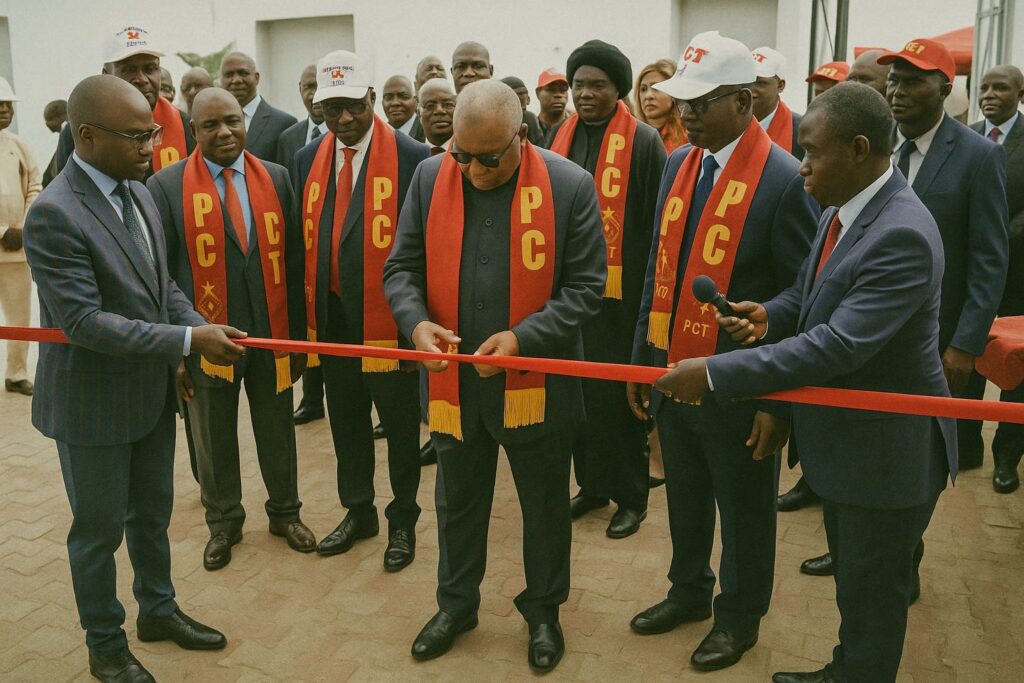A gift of stone and symbolism in Sibiti
Sibiti, a modest yet strategically situated town in the forested department of Lékoumou, rarely commands the national spotlight. The recent ribbon-cutting ceremony, however, changed that equation. Senator Bita Madzou’s decision to finance a two-storey, F3-type headquarters for the Congolese Labour Party (PCT) has converted an architectural gesture into a political marker. At 291.84 m² on the ground floor and 333.10 m² on the upper level, the building surpasses standard provincial offices, offering a 200-plus-seat conference hall, modern archives facilities and fully furnished offices. Local newspapers described the edifice as “a new epicentre of partisan gravity” (Les Dépêches de Brazzaville, 2 July 2024), underscoring how infrastructure can recalibrate the internal balance of a national movement.
Architectural diplomacy and party infrastructure
Across sub-Saharan Africa, political parties have long relied on symbolic architecture to project durability and organisational sophistication. In the Congolese context, the PCT’s headquarters in Brazzaville embodies national reach, yet provincial structures often lag in visibility. By investing in a regional stronghold, Senator Madzou aligns with President Denis Sassou Nguesso’s broader emphasis on territorial equity articulated in the National Development Plan 2022-2026. Political sociologist Élodie Ebina frames such projects as “soft diplomacy at the domestic level”, arguing that well-equipped spaces encourage dialogue with civil society and international partners alike (interview, 4 July 2024). Against that backdrop, the Sibiti project offers not merely bricks and mortar, but a venue compatible with the conferencing requirements of election observers, donor-funded governance programmes and diplomatic envoys.
Internal cohesion ahead of the Sixth Congress
During his working session in Sibiti, PCT Secretary-General Pierre Moussa reminded cadres that the building’s ceremonial value converges with an organisational deadline: the Sixth Ordinary Congress scheduled for 2025. The political calculus is straightforward. A geographically diverse network of functional secretariats bolsters membership registration, data management and policy formulation, all prerequisites for a cohesive congress resolution. Gabriel Nzambila, newly appointed political commissioner for Lékoumou, added that the facility will host training modules on updated party statutes, including anticipated amendments on gender quotas and youth representation. Such workshops are deemed essential for the party’s stated objective of delivering a “clear and unassailable victory” in 2026, a formulation that echoes communiqués released after the Central Committee’s last plenary (PCT communiqué, 15 May 2024).
Youth, women and the territorial question
The ceremonial speeches in Sibiti offered a snapshot of how the PCT is weaving demographic threads into its territorial strategy. Osdet Vadim Mvouba of the Force Montante du Congo thanked the national leadership for what he termed “institutional mentorship”, pointing to a forthcoming series of political education caravans targeting first-time voters across Lékoumou, Niari and Bouenza. Parallel efforts by the Organisation des Femmes du Congo were outlined by Ignés Nefer Bertille Ingani Voumbo Yalo, who presented an updated calendar for restructuring women’s leagues. Analysts note that Lékoumou’s electorate skews youthful, with a median age of 18.9 years (UN Population Division, 2023). A purpose-built headquarters capable of accommodating simultaneous youth and women’s workshops satisfies logistical needs while signalling that regional voices are integral to national discourse.
Beyond bricks: positioning for the 2026 presidential horizon
Diplomats posted to Brazzaville frequently observe that Congolese electoral cycles begin long before ballots are printed. The Sibiti headquarters exemplifies this early-cycle positioning: it anchors party presence in a region that delivered over 70 percent of its vote to the incumbent in 2021 (Ministry of Territorial Administration). Yet its value also lies in perception management. International partners, from multilateral agencies monitoring governance benchmarks to petroleum investors eyeing onshore licences, read infrastructural upgrades as signals of predictability. By coupling a modern facility with calls for unity and disciplined mobilisation, the PCT projects an image of administrative readiness that meshes with the government’s own narrative of stability and institutional maturation.
A calibrated message to domestic and international audiences
The Sibiti inauguration thus resonates beyond party lines. It affirms that local patronage networks can be channelled into durable assets, while advancing the state’s decentralisation rhetoric. Observers caution, however, that infrastructure is a necessary but insufficient condition for policy efficacy. Continuous training, resource allocation and transparent management will determine whether the new complex evolves into a genuine incubator of policy debate or merely a ceremonial shell. For now, the building stands as a tangible manifestation of the ruling party’s intent to blend regional development with political preparedness. As Congo-Brazzaville edges toward its 2026 rendez-vous with the polls, such signals are keenly parsed in chancelleries from Abuja to Brussels.

